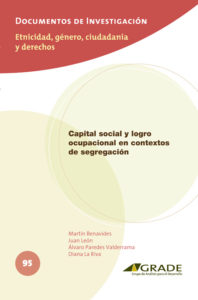Capital social y logro ocupacional en contextos de segregación
| Year | : | 2019 |
|---|---|---|
| Author/s | : | Martín Benavides, Juan Leon, Álvaro Paredes, Diana La Riva |
| Area/s | : | Ethnicity, gender and citizenship |
Benavides, Martín; Juan León, Álvaro Paredes y Diana La Riva (2019). Capital social y logro ocupacional en contextos de segregación. Documento de Investigación, 95. Lima: GRADE.
This study explores the influence of socioeconomic segregation in neighborhoods of Metropolitan Lima on the occupational achievement of heads of households, as well as the relevance of social capital in this relationship.
Using the databases of the Nopoor project, a direct, negative and statistically significant relationship is identified between segregation and occupational achievement. In addition, the elected mediator of neighborhood social capital is positively related to both segregation and the likelihood of achieving professional employment. Thus, although living in segregated neighborhoods negatively affects occupational achievement, having more networks of contacts can mitigate the negative effects of economic segregation.
The qualitative analysis confirms that the social networks of heads of households played a relevant role in the careers of some of them, who reached professional jobs. However, it was found that the neighborhood networks intervened in a different way: on the one hand, hindering the opportunities of the heads of households to establish networks with neighbors who were in a better social position and had greater resources than they; on the other hand, enabling their professionalization.






